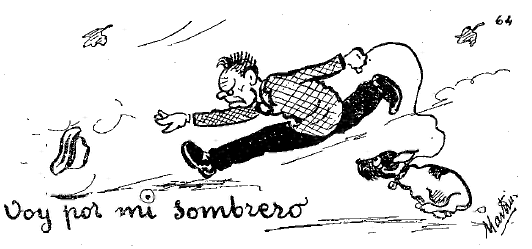
| Языки :: Испанский |
| Аудио |
 |
|
|
179 |
Español |
Spanish |
|
Lección Sesenta y cuarto (64) |
||
| No me hace falta, pero... (1) | I do not miss (it), but.. | |
| 1 |
Llevo tres días en Madrid (2), y todavía no he retirado mi baúl de la consigna. |
I have been [am] in Madrid for 3 days and I have not yet fetched my trunk from the cloak-room. |
| 2 | No me hacia falta, porque tengo en las maletas ropas suficiente para unos días : | I did not feel the need (of it), because I have in my suit-cases enough linen for a few days : |
| 3 | camisas, cuellos, calzoncillos, calcetines, pañuelos, pijamas; (3) | shirts, collars, pants, socks, handkerchiefs, pyjamas; |
| 4 |
objetos de aseo : jabón, cepillo y pasta de dientes, brocha, máquina y crema de afeitar (4); |
toilet-things; soap, tooth-brush and tooth-paste; shaving-brush, safety-razor, shaving-cream: |
| 5 |
un par de zapatos, zapatillas, unas corbatas, papel ele escribir, sobres, tinta estilográfica, lápices, etcétera (5). |
a pair of shoes, slippers, a few ties, note-paper, envelopes, fountain-pen ink, pencils, etc... |
| 6 | Me parece que voy a continuar en esta pensión, y de todos modos más vale ir por él baúl, (6) | I think that I am going to stay [continue] in this boarding-house and by all means, it's better [more is-worth] to go for the trunk, |
| 7 |
porque no sé cuanto cobrarán diario por guardarlo, y podría tener una sorpresa desagradable. |
because I don't know how-much they will charge (me) per day to keep it, and I might have a disagreeable surprise. |
| EJERCICIOS | EXERCISE : | |
| 1 | ¿Cuánto tiempo lleva usted aquí (or: ¿Desde cuándo está usted aquí?) | How long have you been [are you] here? |
| 2 | Llevo tres días (or : Desde hace tres días), y me marcharé pasado mañana. | (For) three days, and I shall leave (the day) after tomorrow [past to-m.]. |
| 3 | ¿Adonde se va usted? | (To) where do you go? |
| 4 | Primero a Toledo, desde donde volveré aquí; después no sé todavía, | First to Toledo, from where I shall come back here; afterwards, I don't know yet. |
| 5 | ¿No le hace falta (or : No necesita usted) un guía para enseñarle la ciudad? | Don't you need a guide to show you the town? |
| 6 | Tomé uno el primer día; ahora prefiero ir a la buena de Dios, | I took one the first day; now I prefer to go at random [at the boon of God], |
| 7 | dando paseos por la ciudad, sin itinerario fijo. | taking walks about [by] the town, without (a) fixed itinerary. |
| NOTES. | |
| 1 |
Me hace falta, to me (it) makes lack, I miss. Or : Lo necesito. — Llevo tres días aquí or Estoy aquí desde hace tres días or Hace tres días que estoy aquí. |
| 2 | Llevar is a current verb, used in many senses. |
| 3 |
El cuello, the neck or collar. — Pron. : PeeHammass. |
| 4 |
Asearse, to wash, make one's toilet. — El cuarto de aseo, dressing-room. — No me he aseado aún (or todavía), I have not yet washed myself. — Afeitarse, to shave (oneself) ; afeitado, shaved. — Soap : el jabón. — Ham : el jamón. |
| 5 |
Un zapato (th), a shoe. — Hay un sobre sobre la mesa de despacho : there is an envelope upon the writing-table. — Un lápiz (lapeeth), a pencil. |
| 6 |
Voy a continuar or voy a quedarme. — Ir por..., to go for. — Voy por mi sombrero, I go for my hat. — Vale más or Más vale, it is [worth] better [more]. Mejor is not used with valer. |
|
Volver, like llevar, has many meanings, among which to
come, or go, back. It's one of the verbs in which o changes into ue under the stress, and it has other irregularities. I come back at once : Vuelvo en seguida. He has not yet come back : No ha vuelto aún. — Remember : una vuelta, a turn, revolution (cf. to revolve). |
